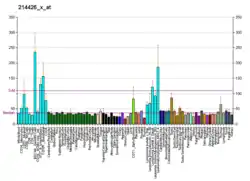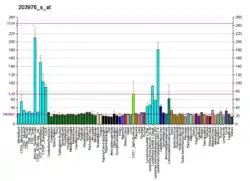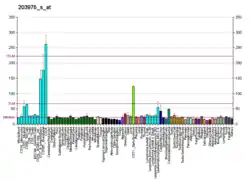CHAF1A
Chromatin assembly factor 1 subunit A is a protein that in humans is encoded by the CHAF1A gene.[4][5]
Function
Chromatin assembly factor I (CAF-1) is a nuclear complex consisting of p50, p60 (CHAF1B; MIM 601245), and p150 (CHAF1A) subunits that assembles histone tetramers onto replicating DNA in vitro (Kaufman et al., 1995).[supplied by OMIM][5]
Interactions
CHAF1A has been shown to interact with:
References
- GRCh38: Ensembl release 89: ENSG00000167670 - Ensembl, May 2017
- "Human PubMed Reference:". National Center for Biotechnology Information, U.S. National Library of Medicine.
- "Mouse PubMed Reference:". National Center for Biotechnology Information, U.S. National Library of Medicine.
- Kaufman PD, Kobayashi R, Kessler N, Stillman B (August 1995). "The p150 and p60 subunits of chromatin assembly factor I: a molecular link between newly synthesized histones and DNA replication". Cell. 81 (7): 1105–14. doi:10.1016/S0092-8674(05)80015-7. PMID 7600578. S2CID 13502921.
- "Entrez Gene: CHAF1A chromatin assembly factor 1, subunit A (p150)".
- Mello JA, Silljé HH, Roche DM, Kirschner DB, Nigg EA, Almouzni G (April 2002). "Human Asf1 and CAF-1 interact and synergize in a repair-coupled nucleosome assembly pathway". EMBO Rep. 3 (4): 329–34. doi:10.1093/embo-reports/kvf068. PMC 1084056. PMID 11897662.
- Ewing RM, Chu P, Elisma F, Li H, Taylor P, Climie S, McBroom-Cerajewski L, Robinson MD, O'Connor L, Li M, Taylor R, Dharsee M, Ho Y, Heilbut A, Moore L, Zhang S, Ornatsky O, Bukhman YV, Ethier M, Sheng Y, Vasilescu J, Abu-Farha M, Lambert JP, Duewel HS, Stewart II, Kuehl B, Hogue K, Colwill K, Gladwish K, Muskat B, Kinach R, Adams SL, Moran MF, Morin GB, Topaloglou T, Figeys D (2007). "Large-scale mapping of human protein-protein interactions by mass spectrometry". Mol. Syst. Biol. 3: 89. doi:10.1038/msb4100134. PMC 1847948. PMID 17353931.
- Jiao R, Bachrati CZ, Pedrazzi G, Kuster P, Petkovic M, Li JL, Egli D, Hickson ID, Stagljar I (June 2004). "Physical and functional interaction between the Bloom's syndrome gene product and the largest subunit of chromatin assembly factor 1". Mol. Cell. Biol. 24 (11): 4710–9. doi:10.1128/MCB.24.11.4710-4719.2004. PMC 416397. PMID 15143166.
- Reese BE, Bachman KE, Baylin SB, Rountree MR (May 2003). "The methyl-CpG binding protein MBD1 interacts with the p150 subunit of chromatin assembly factor 1". Mol. Cell. Biol. 23 (9): 3226–36. doi:10.1128/mcb.23.9.3226-3236.2003. PMC 153189. PMID 12697822.
- Lechner MS, Begg GE, Speicher DW, Rauscher FJ (September 2000). "Molecular determinants for targeting heterochromatin protein 1-mediated gene silencing: direct chromoshadow domain-KAP-1 corepressor interaction is essential". Mol. Cell. Biol. 20 (17): 6449–65. doi:10.1128/mcb.20.17.6449-6465.2000. PMC 86120. PMID 10938122.
Further reading
- Ridgway P, Almouzni G (2000). "CAF-1 and the inheritance of chromatin states: at the crossroads of DNA replication and repair". J. Cell Sci. 113 (15): 2647–58. PMID 10893180.
- Verreault A, Kaufman PD, Kobayashi R, Stillman B (1996). "Nucleosome assembly by a complex of CAF-1 and acetylated histones H3/H4". Cell. 87 (1): 95–104. doi:10.1016/S0092-8674(00)81326-4. PMID 8858152. S2CID 1416453.
- Marheineke K, Krude T (1998). "Nucleosome assembly activity and intracellular localization of human CAF-1 changes during the cell division cycle". J. Biol. Chem. 273 (24): 15279–86. doi:10.1074/jbc.273.24.15279. PMID 9614144.
- Shibahara K, Stillman B (1999). "Replication-dependent marking of DNA by PCNA facilitates CAF-1-coupled inheritance of chromatin". Cell. 96 (4): 575–85. doi:10.1016/S0092-8674(00)80661-3. PMID 10052459. S2CID 13912324.
- Murzina N, Verreault A, Laue E, Stillman B (1999). "Heterochromatin dynamics in mouse cells: interaction between chromatin assembly factor 1 and HP1 proteins". Mol. Cell. 4 (4): 529–40. doi:10.1016/S1097-2765(00)80204-X. PMID 10549285.
- Moggs JG, Grandi P, Quivy JP, Jónsson ZO, Hübscher U, Becker PB, Almouzni G (2000). "A CAF-1–PCNA-Mediated Chromatin Assembly Pathway Triggered by Sensing DNA Damage". Mol. Cell. Biol. 20 (4): 1206–18. doi:10.1128/MCB.20.4.1206-1218.2000. PMC 85246. PMID 10648606.
- Lechner MS, Begg GE, Speicher DW, Rauscher FJ (2000). "Molecular Determinants for Targeting Heterochromatin Protein 1-Mediated Gene Silencing: Direct Chromoshadow Domain–KAP-1 Corepressor Interaction Is Essential". Mol. Cell. Biol. 20 (17): 6449–65. doi:10.1128/MCB.20.17.6449-6465.2000. PMC 86120. PMID 10938122.
- Dong H, Lin W, Zhang CK, Xiong H, Fu G, Jin WR, Chen R, Chen Z, Qi ZT, Huang GM (2001). "Genomic sequence and expression analyses of human chromatin assembly factor 1 p150 gene". Gene. 264 (2): 187–96. doi:10.1016/S0378-1119(01)00335-3. PMID 11250073.
- Mello JA, Silljé HH, Roche DM, Kirschner DB, Nigg EA, Almouzni G (2002). "Human Asf1 and CAF-1 interact and synergize in a repair-coupled nucleosome assembly pathway". EMBO Rep. 3 (4): 329–34. doi:10.1093/embo-reports/kvf068. PMC 1084056. PMID 11897662.
- Reese BE, Bachman KE, Baylin SB, Rountree MR (2003). "The Methyl-CpG Binding Protein MBD1 Interacts with the p150 Subunit of Chromatin Assembly Factor 1". Mol. Cell. Biol. 23 (9): 3226–36. doi:10.1128/MCB.23.9.3226-3236.2003. PMC 153189. PMID 12697822.
- Morel AP, Sentis S, Bianchin C, Le Romancer M, Jonard L, Rostan MC, Rimokh R, Corbo L (2004). "BTG2 antiproliferative protein interacts with the human CCR4 complex existing in vivo in three cell-cycle-regulated forms". J. Cell Sci. 116 (Pt 14): 2929–36. doi:10.1242/jcs.00480. PMID 12771185.
- Kitagawa H, Fujiki R, Yoshimura K, Mezaki Y, Uematsu Y, Matsui D, Ogawa S, Unno K, Okubo M, Tokita A, Nakagawa T, Ito T, Ishimi Y, Nagasawa H, Matsumoto T, Yanagisawa J, Kato S (2003). "The chromatin-remodeling complex WINAC targets a nuclear receptor to promoters and is impaired in Williams syndrome". Cell. 113 (7): 905–17. doi:10.1016/S0092-8674(03)00436-7. PMID 12837248.
- Glinsky GV, Glinskii AB, Stephenson AJ, Hoffman RM, Gerald WL (2004). "Gene expression profiling predicts clinical outcome of prostate cancer". J. Clin. Invest. 113 (6): 913–23. doi:10.1172/JCI20032. PMC 362118. PMID 15067324.
- Jiao R, Bachrati CZ, Pedrazzi G, Kuster P, Petkovic M, Li JL, Egli D, Hickson ID, Stagljar I (2004). "Physical and Functional Interaction between the Bloom's Syndrome Gene Product and the Largest Subunit of Chromatin Assembly Factor 1". Mol. Cell. Biol. 24 (11): 4710–9. doi:10.1128/MCB.24.11.4710-4719.2004. PMC 416397. PMID 15143166.
- Lehner B, Sanderson CM (2004). "A Protein Interaction Framework for Human mRNA Degradation". Genome Res. 14 (7): 1315–23. doi:10.1101/gr.2122004. PMC 442147. PMID 15231747.
- Beausoleil SA, Jedrychowski M, Schwartz D, Elias JE, Villén J, Li J, Cohn MA, Cantley LC, Gygi SP (2004). "Large-scale characterization of HeLa cell nuclear phosphoproteins". Proc. Natl. Acad. Sci. U.S.A. 101 (33): 12130–5. doi:10.1073/pnas.0404720101. PMC 514446. PMID 15302935.
- Sarraf SA, Stancheva I (2004). "Methyl-CpG binding protein MBD1 couples histone H3 methylation at lysine 9 by SETDB1 to DNA replication and chromatin assembly". Mol. Cell. 15 (4): 595–605. doi:10.1016/j.molcel.2004.06.043. PMID 15327775.
External links
- CHAF1A human gene location in the UCSC Genome Browser.
- CHAF1A human gene details in the UCSC Genome Browser.
This article is issued from Wikipedia. The text is licensed under Creative Commons - Attribution - Sharealike. Additional terms may apply for the media files.




